Unit 9 Have you ever been to a museum? 复习课件(28张PPT,无音频)
文档属性
| 名称 | Unit 9 Have you ever been to a museum? 复习课件(28张PPT,无音频) | 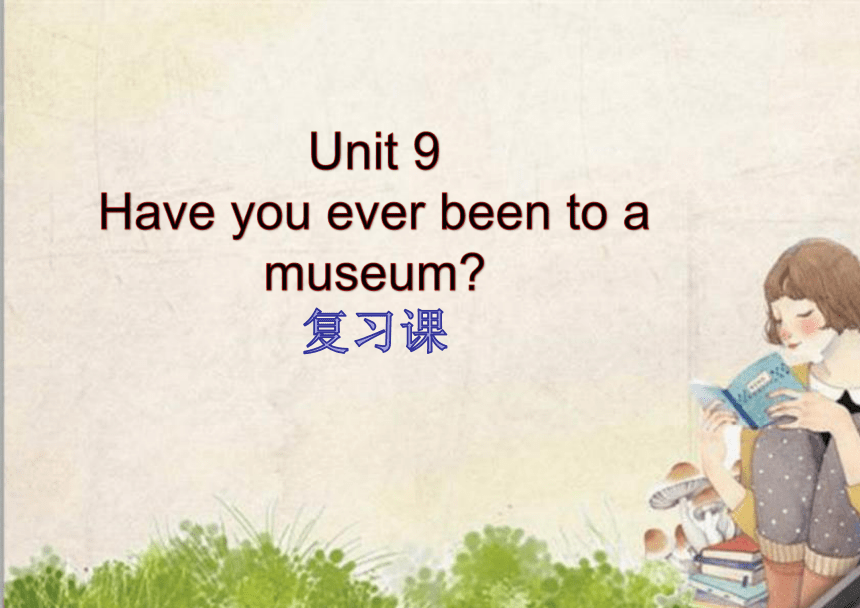 | |
| 格式 | ppt | ||
| 文件大小 | 2.6MB | ||
| 资源类型 | 教案 | ||
| 版本资源 | 人教新目标(Go for it)版 | ||
| 科目 | 英语 | ||
| 更新时间 | 2020-07-04 22:05:20 | ||
图片预览

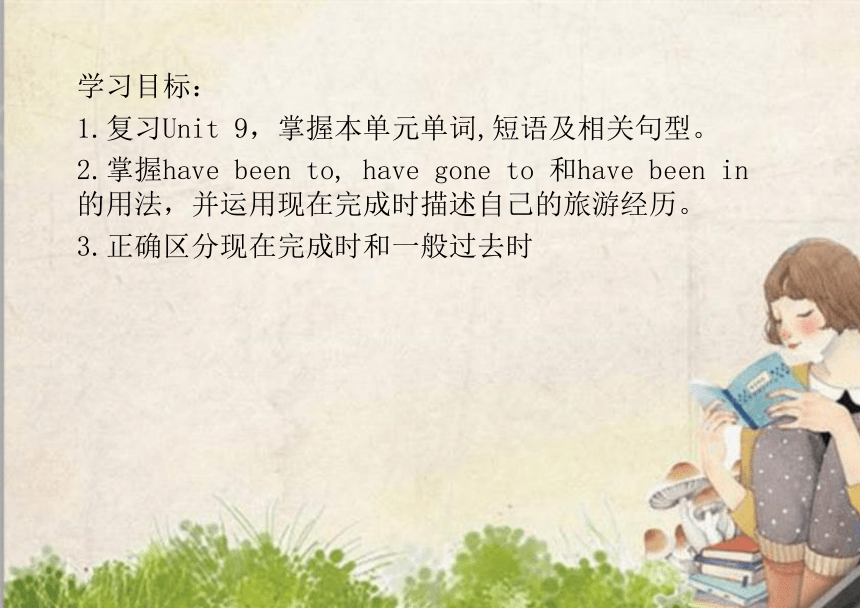
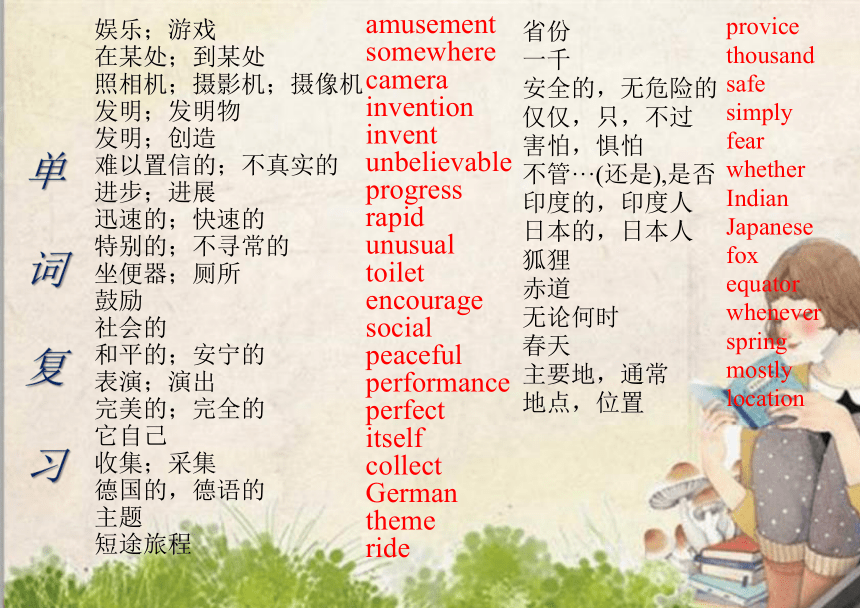
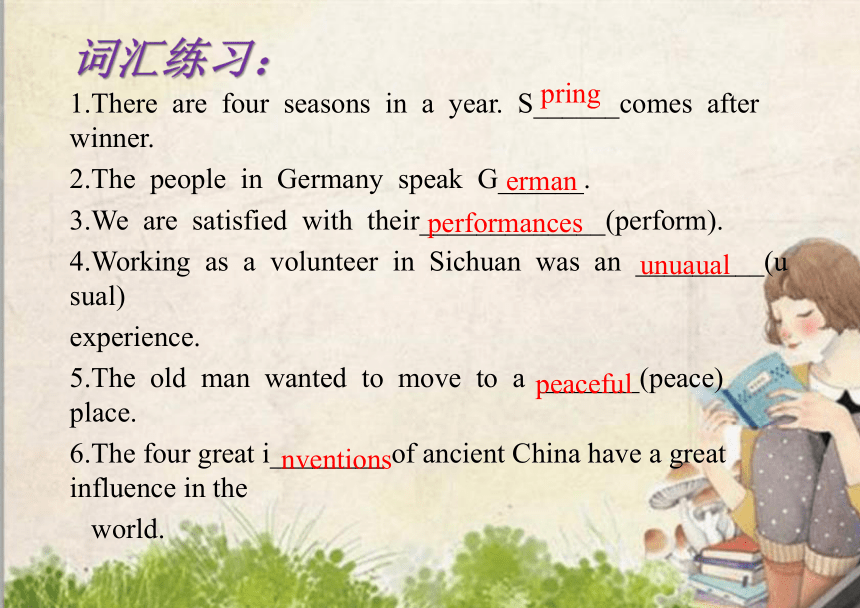
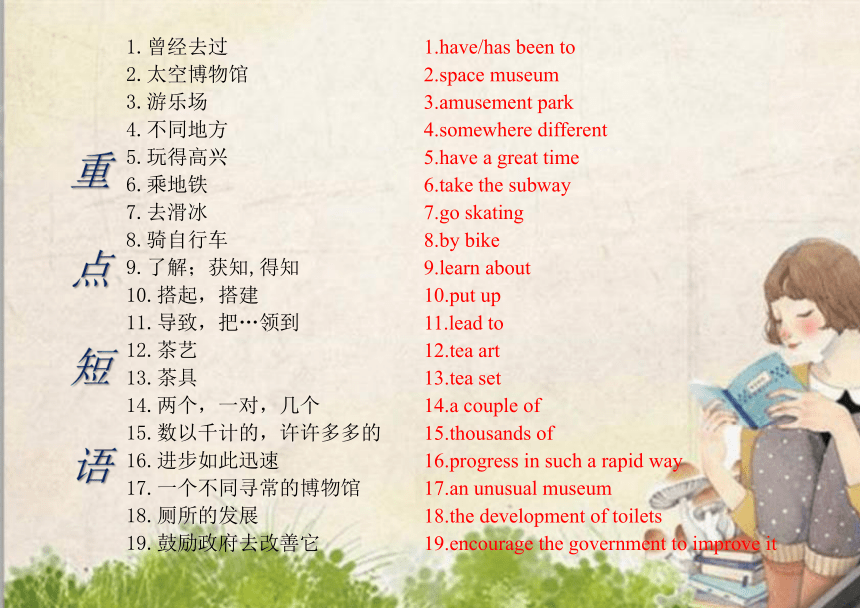
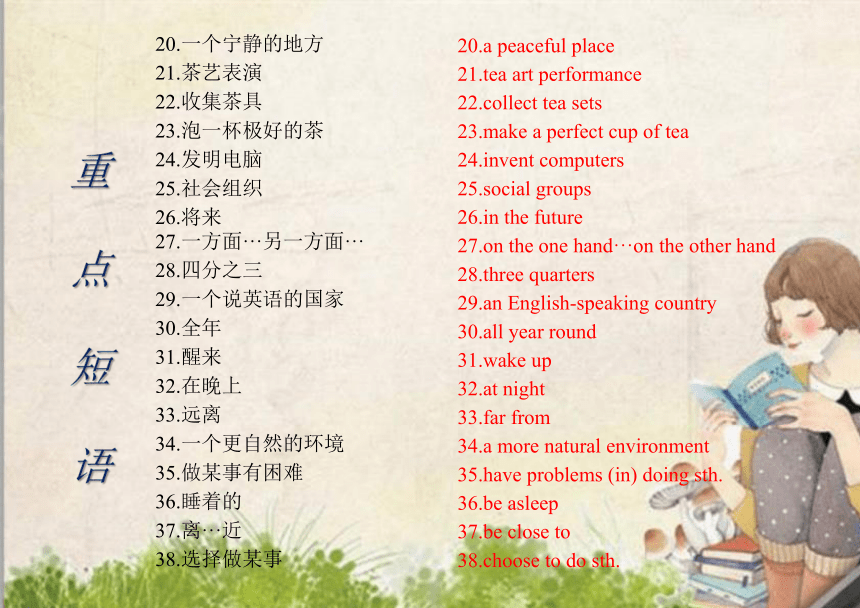
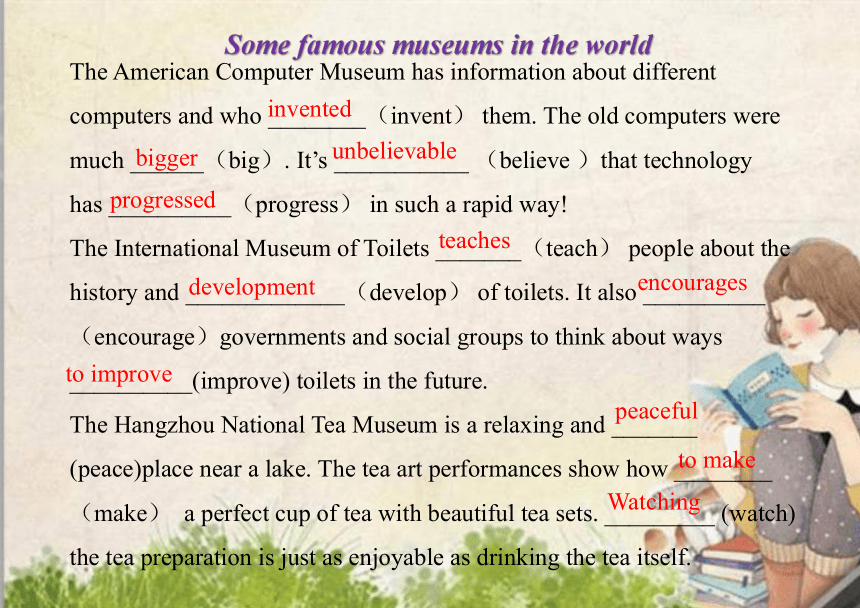
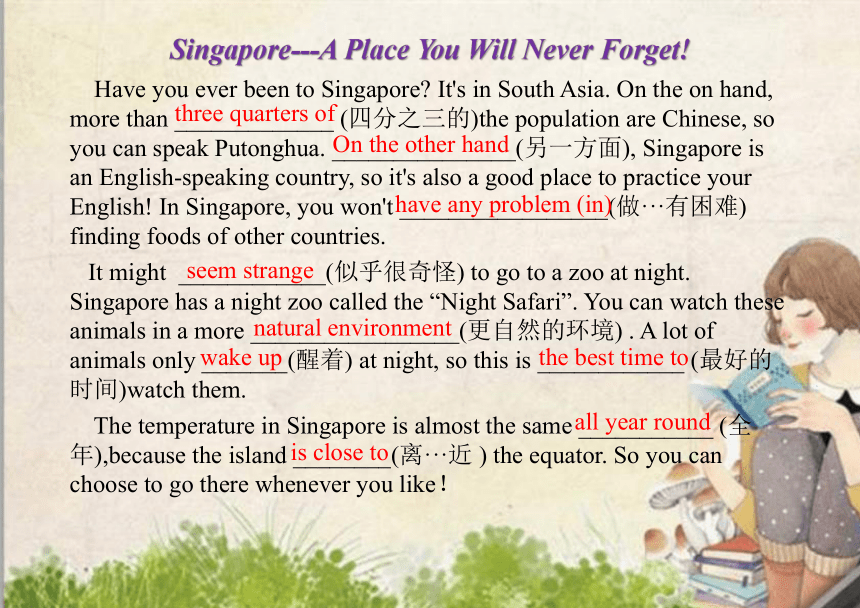
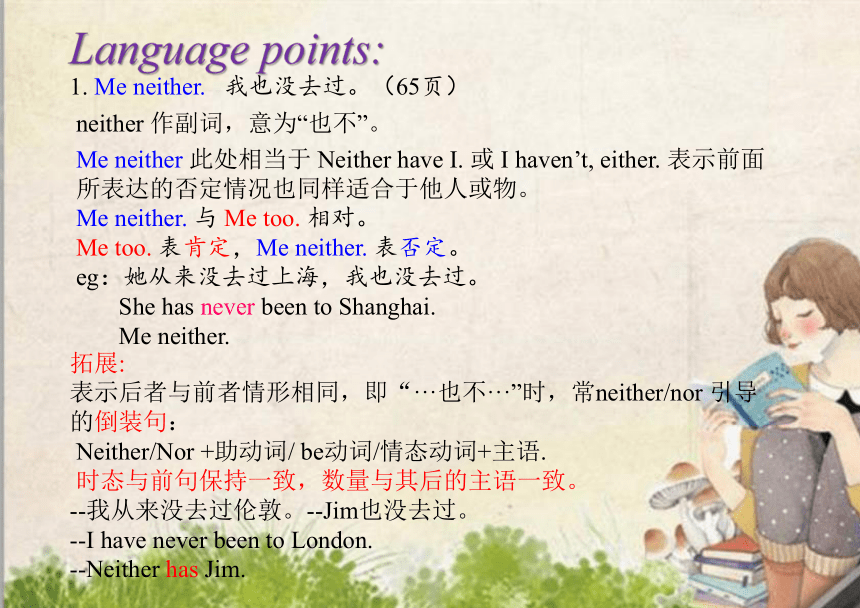
文档简介
学习目标:
1.复习Unit 9,掌握本单元单词,短语及相关句型。
2.掌握have been to, have gone to 和have been in 的用法,并运用现在完成时描述自己的旅游经历。
3.正确区分现在完成时和一般过去时
娱乐;游戏
在某处;到某处
照相机;摄影机;摄像机
发明;发明物
发明;创造
难以置信的;不真实的
进步;进展
迅速的;快速的
特别的;不寻常的
坐便器;厕所
鼓励
社会的
和平的;安宁的
表演;演出
完美的;完全的
它自己
收集;采集
德国的,德语的
主题
短途旅程
amusement
somewhere
camera
invention
invent
unbelievable
progress
rapid
unusual
toilet
encourage
social
peaceful
performance
perfect
itself
collect
German
theme
ride
省份
一千
安全的,无危险的
仅仅,只,不过
害怕,惧怕
不管···(还是),是否
印度的,印度人
日本的,日本人
狐狸
赤道
无论何时
春天
主要地,通常
地点,位置
provice
thousand
safe
simply
fear
whether
Indian
Japanese
fox
equator
whenever
spring
mostly
location
单词复习
词汇练习:1.There?are?four?seasons?in?a?year.?S______comes?after?winner.
2.The?people?in?Germany?speak?G______.
3.We?are?satisfied?with?their_____________(perform).
4.Working?as?a?volunteer?in?Sichuan?was?an?_________(usual)?
experience.
5.The?old?man?wanted?to?move?to?a?_______(peace) place.
6.The four great i________ of ancient China have a great influence in the
world.
pring
performances
peaceful
nventions
erman
unuaual
1.曾经去过
2.太空博物馆
3.游乐场
4.不同地方
5.玩得高兴
6.乘地铁
7.去滑冰
8.骑自行车
9.了解;获知,得知
10.搭起,搭建
11.导致,把…领到
12.茶艺
13.茶具
14.两个,一对,几个
15.数以千计的,许许多多的
16.进步如此迅速
17.一个不同寻常的博物馆
18.厕所的发展
19.鼓励政府去改善它
1.have/has been to
2.space museum
3.amusement park
4.somewhere different
5.have a great time
6.take the subway
7.go skating
8.by bike
9.learn about
10.put up
11.lead to
12.tea art
13.tea set
14.a couple of
15.thousands of
16.progress in such a rapid way
17.an unusual museum
18.the development of toilets
19.encourage the government to improve it
重点短语
20.一个宁静的地方
21.茶艺表演
22.收集茶具
23.泡一杯极好的茶
24.发明电脑
25.社会组织
26.将来
27.一方面···另一方面···
28.四分之三
29.一个说英语的国家
30.全年
31.醒来
32.在晚上
33.远离
34.一个更自然的环境
35.做某事有困难
36.睡着的
37.离···近
38.选择做某事
20.a peaceful place
21.tea art performance
22.collect tea sets
23.make a perfect cup of tea
24.invent computers
25.social groups
26.in the future
27.on the one hand···on the other hand
28.three quarters
29.an English-speaking country
30.all year round
31.wake up
32.at night
33.far from
34.a more natural environment
35.have problems (in) doing sth.
36.be asleep
37.be close to
38.choose to do sth.
重点短语
The American Computer Museum has information about different computers and who ________(invent) them. The old computers were much ______(big). It’s ___________ (believe )that technology has __________(progress) in such a rapid way!
The International Museum of Toilets _______(teach) people about the history and _____________(develop) of toilets. It also __________ (encourage)governments and social groups to think about ways __________(improve) toilets in the future.
The Hangzhou National Tea Museum is a relaxing and _______ (peace)place near a lake. The tea art performances show how ________(make) a perfect cup of tea with beautiful tea sets. _________ (watch) the tea preparation is just as enjoyable as drinking the tea itself.
invented
progressed
bigger
unbelievable
teaches
encourages
development
to improve
peaceful
Watching
to make
Some famous museums in the world
Have you ever been to Singapore? It's in South Asia. On the on hand, more than _____________ (四分之三的)the population are Chinese, so you can speak Putonghua. _______________(另一方面), Singapore is an English-speaking country, so it's also a good place to practice your English! In Singapore, you won't _________________(做···有困难) finding foods of other countries.
It might ____________(似乎很奇怪) to go to a zoo at night. Singapore has a night zoo called the “Night Safari”. You can watch these animals in a more _________________(更自然的环境) . A lot of animals only _______(醒着) at night, so this is ____________ (最好的时间)watch them.
The temperature in Singapore is almost the same ___________ (全年),because the island ________(离···近 ) the equator. So you can choose to go there whenever you like!
Singapore---A Place You Will Never Forget!
three quarters of
On the other hand
have any problem (in)
seem strange
natural environment
wake up
the best time to
all year round
is close to
1. Me neither. 我也没去过。(65页)
neither 作副词,意为“也不”。
Me neither 此处相当于 Neither have I. 或 I haven’t, either. 表示前面所表达的否定情况也同样适合于他人或物。
Me neither. 与 Me too. 相对。
Me too. 表肯定,Me neither. 表否定。
eg:她从来没去过上海,我也没去过。
She has never been to Shanghai.
Me neither.
拓展:
表示后者与前者情形相同,即“···也不···”时,常neither/nor 引导的倒装句:
Neither/Nor +助动词/ be动词/情态动词+主语.
时态与前句保持一致,数量与其后的主语一致。
--我从来没去过伦敦。--Jim也没去过。
--I have never been to London.
--Neither has Jim.
Language points:
2.They are going to take the subway.(66页)
take动词,表示“乘车(船)等”,后面跟冠词,再接交通工具
take a taxi take the bus
by 介词,表示“通过···方式”,后面可直接跟交通工具
by bus by bike by car
eg: Shall we go there by bus or take a taxi?
3.It's really interesting, isn't it?(66页)
反义疑问句
肯定陈述+简略否定问句 否定陈述+简略肯定问句
前肯定后否定 前否定后肯定
反义疑问句前后两部分再时态、人称和数上都要保持一致。
eg:
She speaks English well, doesn't she?
You don't like rock music, do you?
4.I learned about the inventions that led to color movies,too.(66页)
我还了解了一些发明,它们成就了彩色电影。
1)此处learn是“了解,获知,得知”,由介词about 或of引入所获知的句意内容。
eg:I only learned about the accident later.
我只是后来才得知了事故的情况。
2)lead to导致,把···领到
eg:
Too much work and too little rest often lead to illness.
过量的工作和过少的休息会引起疾病。
5.We put up a tent and cooked outside.(66页)
put up “搭起;举起;张贴” put up a tent 搭帐篷
eg: If you know the answer,please put up your hand.
6.The most interesting museun I've ever been to is the American Computer Museum. (66页)
I've ever been to是定语从句,用来修饰前边的先行词museum
eg:
The bike is the best gift I have ever received.
7.They have information about different computers and who invented them. (66页)
1)information 意为“信息”,不可数名词
一条信息:a piece of information
information与介词about连用,表示“关于……的信息”
2)invent v.发明,创造
n. invention 发明,发明物 n. inventor发明家
(杭州中考)The telephone was i________ in 1876.
nvented
8.It’s unbelievable that technology has progressed in such a rapid way! (66页)
1) unbelievable un + believable = unbelievable 难以置信的;不真实的
反义词believable可信的
eg:They work at an unbelievable speed.他们以难以置信的速度工作。
2) that technology has progressed in such a rapid way是that引导的主语从句,it是形式主语,真正的主语时that后边的从句
3) in such a rapid way以如此快的方式
such a rapid way是such + a/an +adj. +可数名词单数结构,相当于“so +adj. +a/an +可数名词单数”
eg:She is such a lovely girl that everyone loves her.
She is so lovely a girl that everyone loves her.
Practice:
Why do you speak in ____ a loud voice?
such
9.I wonder how much more computers will be able to do in the
future.(66页)
1)wonder=want to know, 表示(对某事)感到疑惑,想要知道,想弄明白等,后面常接由what, how, who或if/whether引导的宾语从句。
eg: I wonder how they're getting on.我想知道他们过得怎么样。
2)从句部分的原始结构是How much more will computers be able to
do in the future?由于充当了宾语从句,疑问结构应改成陈述结构
how much more computers will be able to do in the future
10.It also encourages governments and social groups to think about ways
to improve toilets in the future.(66页)
encourage sb. to do sth 鼓励某人做某事
encourage sb. in sth 在某方面鼓励某人
Practice:
The competition hoped to encourage the farmers __________ (grow)
better crops.
to grow
11.The tea art performances show how to make a perfect cup of tea with beautiful tea sets.(66页)茶艺表演展示了如何使用精美的茶具沏出一杯完美的茶。
tea art performances茶艺表演
how to make a perfect cup of tea“特殊疑问词+动词不定式”结构,作show的宾语
12.Watching the tea preparation is just as enjoyable as drinking the tea itself. (66页)
1)-able是典型的形容词后缀,可加在动词之后,表示“可···的,能够···的”,此处enjoyable(能使人愉快的)就是一例,再如:drinkable, washable, usable···
2)动名词做主语,谓语动词用单数
Our teacher always says ,''________ (learn)English well ____(be)
very important.''
Learning
is
13.For thousands of tourists from China, this small island in Southeast Asia is a wonderful and safe place to take a holiday. (70页)
thousands of 数以千记的;许许多多的。
当thousand前面有具体的数字时,用单数形式;
当thousand后与of连用时用复数形式。
类似用法:million, hundred
14.On the one hand, more than three quarters of the population are Chinese, so you can speak Putonghua. On the other hand, Singapore is an English-speaking country, so it's also a good place to practice your English!
1)on the one hand···,on the other hand···一方面···,另一方面···,用于两方面的陈述,彼此既可以是并列关系,也可以是对比的关系。
eg:On the one hand, we should shudy hard. On the other hand, we
should learn to rest.
2) more than 超过,多于,相当于over
He played basketball more than two hours yesterady afternoon.
3)three quarters of the population
population 表示人口多、少时,用largr/big和small,询问人口数量时用what What' s the population of your country?
population作主语时,谓语动词用单数形式,如:
The population of my town is small.
但如果population被表示分数的词修饰,表示“人口、居民”时,谓语动词用复数。如:three quarters of the population are Chinese
Practice:
The population of our city ___ (be) about 3 million.
One third of the population _____ (be) workers.
4)分数的表达:
分子用基数词,分母用序数词,分子如果大于1, 分母+s
先读分子,再读分母
如:1/3 one third 1/5 one fifth 2/3 two thirds 2/5 two fifths
四分之一 one quarter 二分之一 one half
Practice: 4/5 5/8 8/9
is
are
15.You won’t have any problem getting rice, noodles or dumplings.(70页)
have problems (in) doing sth. “做某事有困难或麻烦”
have trouble/difficulty (in) doing sth.
eg:We had problems (in) understanding what he said.
我们理解他说的话有困难。
(泰州中考) They seem to have a problem _____ the work in half an hour.
A.to finish B. finishing C. finish D.finished
16.Whether you like Indian food, Western food or Japanese food, you’ll
all in Singapore!
whether…or…常用于连接两个并列成分,意为“不管···还是···”
Whether it will be fine or not, I must go home.
不管天气是好是坏,我必须回家。
(黔东南中考)--I don't know ____ or not.
-- Neither do I. You may ask his teacher.
A. whether he is at school B.that he is at school
C. whether is he at school
B
A
17.One great thing about Singapore is that the temperature is
almost the same all year round. (70页)
1)本句中one great thing 是主语,about Singapore是介词短语,作后置定语修饰thing,is 是系动词,that引导表语从句the temperature is almost the same all year round
2)all year round 全年,相当于all the year
18. So you can choose to go whenever you like — spring, summer,
autumn or winter.(70页)
1) choose to do 选择做某事
They choose to join the English club.
Practice:
They had a discussion and chose ____ on a picnic this afternoon.
A.go B. to go C. going D.went
2) whenever 无论何时,相当于no matter when, 与when用法相似,
但语气更强。
whenever还可表示“每当,每次”
Whenever I see him ,he is reading. 我每次看到他,他都在看书。
B
现在完成时(2)
语法加油站
1. 现在完成时态的标志词:
1) ever和never 多用于否定或疑问句中,表示“曾经或从未”等。
—Have you ever been to the Great Wall?
???? 你曾经去过长城吗?
—No, I have never been to the Great Wall.
???? 不, 我从未去过长城。
2) 用表示到说话为止的过去时间状语, 如just, before, up to now(至今; 迄今; 到目前为止)等。
I have seen her before, but I can not remember where.
我以前见过她, 但记不起在哪里见过。???
语法聚焦:
Practice:
他们已经去北京了。
They ____________ Beijing.
我在北京待了一周。
I ___________ Beijing for a week.
我今年去过那里两次了。
I _________ there twice this year.
have gone to
have been in
heve been
用法
例句
have/has been to
强调“去过”某地,人已经回来,后面可接表示次数的状语。
I have been to Shanghai twice. 我去过上海两次。
have/has gone to
强调“去了”某地,现在不在说话的现场。
My father has gone to Shanghai for a meeting.
他(已经)去了上海。
have/has been in
表示某人“已经在某地住了一段时间”,现在仍在那里。
The old man has been in the city for many years. 那个老人已经在这个城市很多年了。
2. 三大句式的用法区别:
单项选择。
1. — I’d like to introduce my best friend to you, Peter.
— Thank you, Lucy. But we _____ already.
A. meet B. met C. have met
2. — The Amazing Spider Man 2 is on these days. It’s fantastic.
??? —Really? But I _______ it yet.
A. didn’t see???? B. won’t see????????
C. haven’t seen?????? D. is not seeing
3. —Where is Mr. Wang? —He _____ the park.
A. has gone to B. have gone to
C. has been to D. have been to
4. — Have you _____ visited Shanghai?— No, _______.
A. ever; not B. never; not C. ever; never
5. — How well do you know Sydney Opera House?
— I know it very well. I _____ Sydney many times.
A. have been in B. have been to C. have gone to
C
C
活学活用:
A
C
B
与一般过去时的用法区别
一般过去时表示过去发生的动作或单纯叙述过去的事情,陈述的
是过去的事实或情况,强调动作发生在过去,和现在没有联系。
而现在完成时是表过去发生的某一动作对现在造成的影响或结果,
强调的是现在的情况。
The Smiths lived on the ninth floor of the building in 2000.
2000年,史密斯一家住在这栋楼的9楼。
(过去住在此处,现在不知是否还住在这里)
The Smiths have lived on the ninth floor of the building since 2000.
史密斯一家自2000年以来就住在这栋楼的9楼。
(他们现在还住在此处)
Practice:
I ____ (read)the book yesterday.
I _____ already _______ (finish) reading this book.
read
have
finished
怎样写旅行经历?
三步法写游记
第一步:引入话题,介绍自己去过的地方。
第二步:写出旅游景点的景色。
第三步:写出作者本人的感受。
思路点拨提示词:
1.引出话题----长城之旅→Have you been to …? I have ever been there.
2.具体描述长城之旅→…took a bus to…; When we got to the foot of …; We saw ····(我们看见····的景色);We began to …;…is like… It is said that …
3.旅行之感→ I was excited when …;Though we were tired, we all felt…
佳作赏析:
A Visit to the Great Wall
Have you ever been to the Great Wall? I have ever been there.
That was a sunny day. My friends and I took a bus to the Great Wall. When we got to the foot of the Great Wall, we saw a lot of visitors. Then we began to climb the Great Wall. At that time, we found that the Great Wall is very long and beautiful. It is like a huge dragon. It is said that it is one of the New Seven Wonders in the world. And the most famous wall is the Badaling Great Wall.
I was excited when I got to the top of the wall. Though we were tired, we all felt very happy.
Exercise
1.?____your?grandmother_____(be)?to?the?Museum?of?Flight?before?2.?I?____________?(study)?English?at?this?school?for?three?years.??3.?Yao?Ming?______?(go)?to?America?three?months?ago.?
4.1?encourage him _________?(study)?hard.??
5.?Do?you?have?any?problem _______(get)?to?the?top?of?the?hill??
6.?It’s?the best time?______?(see)?the animals at night.?
7.?Next?month?Harry?___________?(visit)?his?grandparents?with?his?parents.?
Has
been
have studied
went
to study
getting
to see
will visit
中考链接:
(湛江中考)1. —I have never been to Tibet. What about you?
—Me,______.
A.too B. also C. either D. neither
(临沂中考)2. ______ people have lost their lives in this earthquake.
A. Thousands B. Thousand of
C. Thousands of D. Ten thousands
(自贡中考)3._____ you like swimming, fishing _____ boating, you’ll have fun in the water park.
A. Whether; or B. If; or
C. Either; or D. Both; and
(咸宁中考)4. Do you have any problem _____ English?
A. learn B. to learn C. learning D. learned
(安徽)5. Her story encouraged us _____ our best to help the poor.
A. do B. done C. to do D. doing
Homework:
1.熟记本单元单词、短语及相关知识点,单词抄写3+1,短语1+1。
2.完成配套练习册相关练习。
3.预习Unit 10 Section A.
1.复习Unit 9,掌握本单元单词,短语及相关句型。
2.掌握have been to, have gone to 和have been in 的用法,并运用现在完成时描述自己的旅游经历。
3.正确区分现在完成时和一般过去时
娱乐;游戏
在某处;到某处
照相机;摄影机;摄像机
发明;发明物
发明;创造
难以置信的;不真实的
进步;进展
迅速的;快速的
特别的;不寻常的
坐便器;厕所
鼓励
社会的
和平的;安宁的
表演;演出
完美的;完全的
它自己
收集;采集
德国的,德语的
主题
短途旅程
amusement
somewhere
camera
invention
invent
unbelievable
progress
rapid
unusual
toilet
encourage
social
peaceful
performance
perfect
itself
collect
German
theme
ride
省份
一千
安全的,无危险的
仅仅,只,不过
害怕,惧怕
不管···(还是),是否
印度的,印度人
日本的,日本人
狐狸
赤道
无论何时
春天
主要地,通常
地点,位置
provice
thousand
safe
simply
fear
whether
Indian
Japanese
fox
equator
whenever
spring
mostly
location
单词复习
词汇练习:1.There?are?four?seasons?in?a?year.?S______comes?after?winner.
2.The?people?in?Germany?speak?G______.
3.We?are?satisfied?with?their_____________(perform).
4.Working?as?a?volunteer?in?Sichuan?was?an?_________(usual)?
experience.
5.The?old?man?wanted?to?move?to?a?_______(peace) place.
6.The four great i________ of ancient China have a great influence in the
world.
pring
performances
peaceful
nventions
erman
unuaual
1.曾经去过
2.太空博物馆
3.游乐场
4.不同地方
5.玩得高兴
6.乘地铁
7.去滑冰
8.骑自行车
9.了解;获知,得知
10.搭起,搭建
11.导致,把…领到
12.茶艺
13.茶具
14.两个,一对,几个
15.数以千计的,许许多多的
16.进步如此迅速
17.一个不同寻常的博物馆
18.厕所的发展
19.鼓励政府去改善它
1.have/has been to
2.space museum
3.amusement park
4.somewhere different
5.have a great time
6.take the subway
7.go skating
8.by bike
9.learn about
10.put up
11.lead to
12.tea art
13.tea set
14.a couple of
15.thousands of
16.progress in such a rapid way
17.an unusual museum
18.the development of toilets
19.encourage the government to improve it
重点短语
20.一个宁静的地方
21.茶艺表演
22.收集茶具
23.泡一杯极好的茶
24.发明电脑
25.社会组织
26.将来
27.一方面···另一方面···
28.四分之三
29.一个说英语的国家
30.全年
31.醒来
32.在晚上
33.远离
34.一个更自然的环境
35.做某事有困难
36.睡着的
37.离···近
38.选择做某事
20.a peaceful place
21.tea art performance
22.collect tea sets
23.make a perfect cup of tea
24.invent computers
25.social groups
26.in the future
27.on the one hand···on the other hand
28.three quarters
29.an English-speaking country
30.all year round
31.wake up
32.at night
33.far from
34.a more natural environment
35.have problems (in) doing sth.
36.be asleep
37.be close to
38.choose to do sth.
重点短语
The American Computer Museum has information about different computers and who ________(invent) them. The old computers were much ______(big). It’s ___________ (believe )that technology has __________(progress) in such a rapid way!
The International Museum of Toilets _______(teach) people about the history and _____________(develop) of toilets. It also __________ (encourage)governments and social groups to think about ways __________(improve) toilets in the future.
The Hangzhou National Tea Museum is a relaxing and _______ (peace)place near a lake. The tea art performances show how ________(make) a perfect cup of tea with beautiful tea sets. _________ (watch) the tea preparation is just as enjoyable as drinking the tea itself.
invented
progressed
bigger
unbelievable
teaches
encourages
development
to improve
peaceful
Watching
to make
Some famous museums in the world
Have you ever been to Singapore? It's in South Asia. On the on hand, more than _____________ (四分之三的)the population are Chinese, so you can speak Putonghua. _______________(另一方面), Singapore is an English-speaking country, so it's also a good place to practice your English! In Singapore, you won't _________________(做···有困难) finding foods of other countries.
It might ____________(似乎很奇怪) to go to a zoo at night. Singapore has a night zoo called the “Night Safari”. You can watch these animals in a more _________________(更自然的环境) . A lot of animals only _______(醒着) at night, so this is ____________ (最好的时间)watch them.
The temperature in Singapore is almost the same ___________ (全年),because the island ________(离···近 ) the equator. So you can choose to go there whenever you like!
Singapore---A Place You Will Never Forget!
three quarters of
On the other hand
have any problem (in)
seem strange
natural environment
wake up
the best time to
all year round
is close to
1. Me neither. 我也没去过。(65页)
neither 作副词,意为“也不”。
Me neither 此处相当于 Neither have I. 或 I haven’t, either. 表示前面所表达的否定情况也同样适合于他人或物。
Me neither. 与 Me too. 相对。
Me too. 表肯定,Me neither. 表否定。
eg:她从来没去过上海,我也没去过。
She has never been to Shanghai.
Me neither.
拓展:
表示后者与前者情形相同,即“···也不···”时,常neither/nor 引导的倒装句:
Neither/Nor +助动词/ be动词/情态动词+主语.
时态与前句保持一致,数量与其后的主语一致。
--我从来没去过伦敦。--Jim也没去过。
--I have never been to London.
--Neither has Jim.
Language points:
2.They are going to take the subway.(66页)
take动词,表示“乘车(船)等”,后面跟冠词,再接交通工具
take a taxi take the bus
by 介词,表示“通过···方式”,后面可直接跟交通工具
by bus by bike by car
eg: Shall we go there by bus or take a taxi?
3.It's really interesting, isn't it?(66页)
反义疑问句
肯定陈述+简略否定问句 否定陈述+简略肯定问句
前肯定后否定 前否定后肯定
反义疑问句前后两部分再时态、人称和数上都要保持一致。
eg:
She speaks English well, doesn't she?
You don't like rock music, do you?
4.I learned about the inventions that led to color movies,too.(66页)
我还了解了一些发明,它们成就了彩色电影。
1)此处learn是“了解,获知,得知”,由介词about 或of引入所获知的句意内容。
eg:I only learned about the accident later.
我只是后来才得知了事故的情况。
2)lead to导致,把···领到
eg:
Too much work and too little rest often lead to illness.
过量的工作和过少的休息会引起疾病。
5.We put up a tent and cooked outside.(66页)
put up “搭起;举起;张贴” put up a tent 搭帐篷
eg: If you know the answer,please put up your hand.
6.The most interesting museun I've ever been to is the American Computer Museum. (66页)
I've ever been to是定语从句,用来修饰前边的先行词museum
eg:
The bike is the best gift I have ever received.
7.They have information about different computers and who invented them. (66页)
1)information 意为“信息”,不可数名词
一条信息:a piece of information
information与介词about连用,表示“关于……的信息”
2)invent v.发明,创造
n. invention 发明,发明物 n. inventor发明家
(杭州中考)The telephone was i________ in 1876.
nvented
8.It’s unbelievable that technology has progressed in such a rapid way! (66页)
1) unbelievable un + believable = unbelievable 难以置信的;不真实的
反义词believable可信的
eg:They work at an unbelievable speed.他们以难以置信的速度工作。
2) that technology has progressed in such a rapid way是that引导的主语从句,it是形式主语,真正的主语时that后边的从句
3) in such a rapid way以如此快的方式
such a rapid way是such + a/an +adj. +可数名词单数结构,相当于“so +adj. +a/an +可数名词单数”
eg:She is such a lovely girl that everyone loves her.
She is so lovely a girl that everyone loves her.
Practice:
Why do you speak in ____ a loud voice?
such
9.I wonder how much more computers will be able to do in the
future.(66页)
1)wonder=want to know, 表示(对某事)感到疑惑,想要知道,想弄明白等,后面常接由what, how, who或if/whether引导的宾语从句。
eg: I wonder how they're getting on.我想知道他们过得怎么样。
2)从句部分的原始结构是How much more will computers be able to
do in the future?由于充当了宾语从句,疑问结构应改成陈述结构
how much more computers will be able to do in the future
10.It also encourages governments and social groups to think about ways
to improve toilets in the future.(66页)
encourage sb. to do sth 鼓励某人做某事
encourage sb. in sth 在某方面鼓励某人
Practice:
The competition hoped to encourage the farmers __________ (grow)
better crops.
to grow
11.The tea art performances show how to make a perfect cup of tea with beautiful tea sets.(66页)茶艺表演展示了如何使用精美的茶具沏出一杯完美的茶。
tea art performances茶艺表演
how to make a perfect cup of tea“特殊疑问词+动词不定式”结构,作show的宾语
12.Watching the tea preparation is just as enjoyable as drinking the tea itself. (66页)
1)-able是典型的形容词后缀,可加在动词之后,表示“可···的,能够···的”,此处enjoyable(能使人愉快的)就是一例,再如:drinkable, washable, usable···
2)动名词做主语,谓语动词用单数
Our teacher always says ,''________ (learn)English well ____(be)
very important.''
Learning
is
13.For thousands of tourists from China, this small island in Southeast Asia is a wonderful and safe place to take a holiday. (70页)
thousands of 数以千记的;许许多多的。
当thousand前面有具体的数字时,用单数形式;
当thousand后与of连用时用复数形式。
类似用法:million, hundred
14.On the one hand, more than three quarters of the population are Chinese, so you can speak Putonghua. On the other hand, Singapore is an English-speaking country, so it's also a good place to practice your English!
1)on the one hand···,on the other hand···一方面···,另一方面···,用于两方面的陈述,彼此既可以是并列关系,也可以是对比的关系。
eg:On the one hand, we should shudy hard. On the other hand, we
should learn to rest.
2) more than 超过,多于,相当于over
He played basketball more than two hours yesterady afternoon.
3)three quarters of the population
population 表示人口多、少时,用largr/big和small,询问人口数量时用what What' s the population of your country?
population作主语时,谓语动词用单数形式,如:
The population of my town is small.
但如果population被表示分数的词修饰,表示“人口、居民”时,谓语动词用复数。如:three quarters of the population are Chinese
Practice:
The population of our city ___ (be) about 3 million.
One third of the population _____ (be) workers.
4)分数的表达:
分子用基数词,分母用序数词,分子如果大于1, 分母+s
先读分子,再读分母
如:1/3 one third 1/5 one fifth 2/3 two thirds 2/5 two fifths
四分之一 one quarter 二分之一 one half
Practice: 4/5 5/8 8/9
is
are
15.You won’t have any problem getting rice, noodles or dumplings.(70页)
have problems (in) doing sth. “做某事有困难或麻烦”
have trouble/difficulty (in) doing sth.
eg:We had problems (in) understanding what he said.
我们理解他说的话有困难。
(泰州中考) They seem to have a problem _____ the work in half an hour.
A.to finish B. finishing C. finish D.finished
16.Whether you like Indian food, Western food or Japanese food, you’ll
all in Singapore!
whether…or…常用于连接两个并列成分,意为“不管···还是···”
Whether it will be fine or not, I must go home.
不管天气是好是坏,我必须回家。
(黔东南中考)--I don't know ____ or not.
-- Neither do I. You may ask his teacher.
A. whether he is at school B.that he is at school
C. whether is he at school
B
A
17.One great thing about Singapore is that the temperature is
almost the same all year round. (70页)
1)本句中one great thing 是主语,about Singapore是介词短语,作后置定语修饰thing,is 是系动词,that引导表语从句the temperature is almost the same all year round
2)all year round 全年,相当于all the year
18. So you can choose to go whenever you like — spring, summer,
autumn or winter.(70页)
1) choose to do 选择做某事
They choose to join the English club.
Practice:
They had a discussion and chose ____ on a picnic this afternoon.
A.go B. to go C. going D.went
2) whenever 无论何时,相当于no matter when, 与when用法相似,
但语气更强。
whenever还可表示“每当,每次”
Whenever I see him ,he is reading. 我每次看到他,他都在看书。
B
现在完成时(2)
语法加油站
1. 现在完成时态的标志词:
1) ever和never 多用于否定或疑问句中,表示“曾经或从未”等。
—Have you ever been to the Great Wall?
???? 你曾经去过长城吗?
—No, I have never been to the Great Wall.
???? 不, 我从未去过长城。
2) 用表示到说话为止的过去时间状语, 如just, before, up to now(至今; 迄今; 到目前为止)等。
I have seen her before, but I can not remember where.
我以前见过她, 但记不起在哪里见过。???
语法聚焦:
Practice:
他们已经去北京了。
They ____________ Beijing.
我在北京待了一周。
I ___________ Beijing for a week.
我今年去过那里两次了。
I _________ there twice this year.
have gone to
have been in
heve been
用法
例句
have/has been to
强调“去过”某地,人已经回来,后面可接表示次数的状语。
I have been to Shanghai twice. 我去过上海两次。
have/has gone to
强调“去了”某地,现在不在说话的现场。
My father has gone to Shanghai for a meeting.
他(已经)去了上海。
have/has been in
表示某人“已经在某地住了一段时间”,现在仍在那里。
The old man has been in the city for many years. 那个老人已经在这个城市很多年了。
2. 三大句式的用法区别:
单项选择。
1. — I’d like to introduce my best friend to you, Peter.
— Thank you, Lucy. But we _____ already.
A. meet B. met C. have met
2. — The Amazing Spider Man 2 is on these days. It’s fantastic.
??? —Really? But I _______ it yet.
A. didn’t see???? B. won’t see????????
C. haven’t seen?????? D. is not seeing
3. —Where is Mr. Wang? —He _____ the park.
A. has gone to B. have gone to
C. has been to D. have been to
4. — Have you _____ visited Shanghai?— No, _______.
A. ever; not B. never; not C. ever; never
5. — How well do you know Sydney Opera House?
— I know it very well. I _____ Sydney many times.
A. have been in B. have been to C. have gone to
C
C
活学活用:
A
C
B
与一般过去时的用法区别
一般过去时表示过去发生的动作或单纯叙述过去的事情,陈述的
是过去的事实或情况,强调动作发生在过去,和现在没有联系。
而现在完成时是表过去发生的某一动作对现在造成的影响或结果,
强调的是现在的情况。
The Smiths lived on the ninth floor of the building in 2000.
2000年,史密斯一家住在这栋楼的9楼。
(过去住在此处,现在不知是否还住在这里)
The Smiths have lived on the ninth floor of the building since 2000.
史密斯一家自2000年以来就住在这栋楼的9楼。
(他们现在还住在此处)
Practice:
I ____ (read)the book yesterday.
I _____ already _______ (finish) reading this book.
read
have
finished
怎样写旅行经历?
三步法写游记
第一步:引入话题,介绍自己去过的地方。
第二步:写出旅游景点的景色。
第三步:写出作者本人的感受。
思路点拨提示词:
1.引出话题----长城之旅→Have you been to …? I have ever been there.
2.具体描述长城之旅→…took a bus to…; When we got to the foot of …; We saw ····(我们看见····的景色);We began to …;…is like… It is said that …
3.旅行之感→ I was excited when …;Though we were tired, we all felt…
佳作赏析:
A Visit to the Great Wall
Have you ever been to the Great Wall? I have ever been there.
That was a sunny day. My friends and I took a bus to the Great Wall. When we got to the foot of the Great Wall, we saw a lot of visitors. Then we began to climb the Great Wall. At that time, we found that the Great Wall is very long and beautiful. It is like a huge dragon. It is said that it is one of the New Seven Wonders in the world. And the most famous wall is the Badaling Great Wall.
I was excited when I got to the top of the wall. Though we were tired, we all felt very happy.
Exercise
1.?____your?grandmother_____(be)?to?the?Museum?of?Flight?before?2.?I?____________?(study)?English?at?this?school?for?three?years.??3.?Yao?Ming?______?(go)?to?America?three?months?ago.?
4.1?encourage him _________?(study)?hard.??
5.?Do?you?have?any?problem _______(get)?to?the?top?of?the?hill??
6.?It’s?the best time?______?(see)?the animals at night.?
7.?Next?month?Harry?___________?(visit)?his?grandparents?with?his?parents.?
Has
been
have studied
went
to study
getting
to see
will visit
中考链接:
(湛江中考)1. —I have never been to Tibet. What about you?
—Me,______.
A.too B. also C. either D. neither
(临沂中考)2. ______ people have lost their lives in this earthquake.
A. Thousands B. Thousand of
C. Thousands of D. Ten thousands
(自贡中考)3._____ you like swimming, fishing _____ boating, you’ll have fun in the water park.
A. Whether; or B. If; or
C. Either; or D. Both; and
(咸宁中考)4. Do you have any problem _____ English?
A. learn B. to learn C. learning D. learned
(安徽)5. Her story encouraged us _____ our best to help the poor.
A. do B. done C. to do D. doing
Homework:
1.熟记本单元单词、短语及相关知识点,单词抄写3+1,短语1+1。
2.完成配套练习册相关练习。
3.预习Unit 10 Section A.
同课章节目录
- Unit 1 What's the matter?
- Section A
- Section B
- Unit 2 I'll help to clean up the city parks.
- Section A
- Section B
- Unit 3 Could you please clean your room?
- Section A
- Section B
- Unit 4 Why don't you talk to your parents?
- Section A
- Section B
- Unit 5 What were you doing when the rainstorm came
- Section A
- Section B
- Review of Units 1-5
- Unit 6 An old man tried to move the mountains.
- Section A
- Section B
- Unit 7 What's the highest mountain in the world?
- Section A
- Section B
- Unit 8 Have you read Treasure Island yet?
- Section A
- Section B
- Unit 9 Have you ever been to a museum?
- Section A
- Section B
- Unit 10 I've had this bike for three years.
- Section A
- Section B
